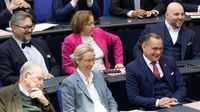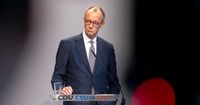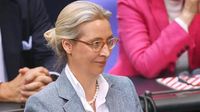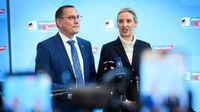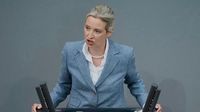In a significant political shift, the Alternative for Germany (AfD) party has overtaken the Christian Democratic Union (CDU) in recent polling, marking a notable change in the German political landscape. According to the latest Forsa poll for RTL/n-tv, the AfD has climbed to 26 percent, while the CDU/CSU remains at 25 percent, indicating a growing support for the party that many label as right-wing extremist.
This marks the first time the AfD has led in the RTL/ntv Trendbarometer, a trend that has been consistent in various surveys since the February 2025 federal election. In that election, the CDU/CSU secured 28.5 percent of the vote, while the SPD garnered 16.4 percent and the AfD achieved its best result to date with 20.8 percent.
Recent polling indicates that the AfD's popularity is rising despite the CDU's efforts to address the issues driving voters toward the far-right party. On April 22, 2025, Alice Weidel, co-chair of the AfD, expressed gratitude to supporters via Twitter, acknowledging the party's increasing traction among the electorate.
Hessian Interior Minister Roman Poseck (CDU) described the AfD's polling success as an "alarming development" during an interview with Welt TV, where he emphasized the party's connections to extremist ideologies and foreign influences, particularly regarding Russia and China. He defended the coalition's migration policies, urging patience as these measures take effect.
In a separate poll conducted by Ipsos on April 9, 2025, the AfD also led over the CDU, suggesting that this trend is not isolated. The recent INSA poll further corroborates this trend, showing the AfD consistently outperforming the CDU in various surveys.
The dynamics of the coalition government, which includes the SPD and CDU, have drawn criticism from the youth organizations of both parties. The Young Socialists argue that the coalition agreement fails to adequately support those in need, while the Young Union claims that the agreement favors social democratic policies.
In light of the AfD's rise, CDU officials are advocating for a unified approach to dealing with the party within the new Bundestag. Thorsten Frei, the Union's parliamentary group manager, stated that discussions with the SPD regarding parliamentary procedures should take place, emphasizing that the focus should not be on the AfD's political classification but rather on how to interact with them in a parliamentary context.
Frei's comments come amid a broader debate within the CDU regarding how to handle the AfD's presence in the Bundestag. Jens Spahn, a member of the CDU presidium, suggested treating the AfD like any other opposition party, a stance that has sparked controversy among party members.
Meanwhile, the SPD Chairman Lars Klingbeil criticized the ongoing discussions about the AfD's role as unnecessary and counterproductive, asserting that there will be no normalization of relations with the party. He expressed concern that such debates could undermine the coalition's efforts to govern effectively.
As the political landscape evolves, Friedrich Merz, the CDU leader, faces a trust crisis, with only 21 percent of Germans considering him trustworthy, according to a Forsa survey. This is a significant decline from previous months, where his ratings were higher. Despite this, Merz is set to be sworn in as Chancellor on May 6, 2025, pending the SPD's approval of the coalition agreement.
In the context of the upcoming election, the AfD's voter potential appears robust, with surveys indicating that over 30 percent of eligible voters may consider supporting the party. Among those who did not vote for the AfD in February, 12 percent expressed a willingness to do so in the future, highlighting the party's expanding appeal.
Polling data reveals that 35 percent of AfD voters align with the party's political views, while 19 percent cite a rejection of the entire political system as a primary reason for their support. Additionally, 24 percent expressed dissatisfaction with the current government as a motivating factor for their vote.
As the coalition government prepares to take office, the implications of the AfD's rise will undoubtedly shape the political discourse in Germany. The CDU and SPD will need to navigate their relationship with the AfD carefully, as the party continues to gain ground among disillusioned voters.
Overall, the political landscape in Germany is shifting, with the AfD's ascent posing challenges for traditional parties. As the coalition prepares to govern, the question remains: how will they respond to the growing influence of the AfD and the concerns of their constituents?
